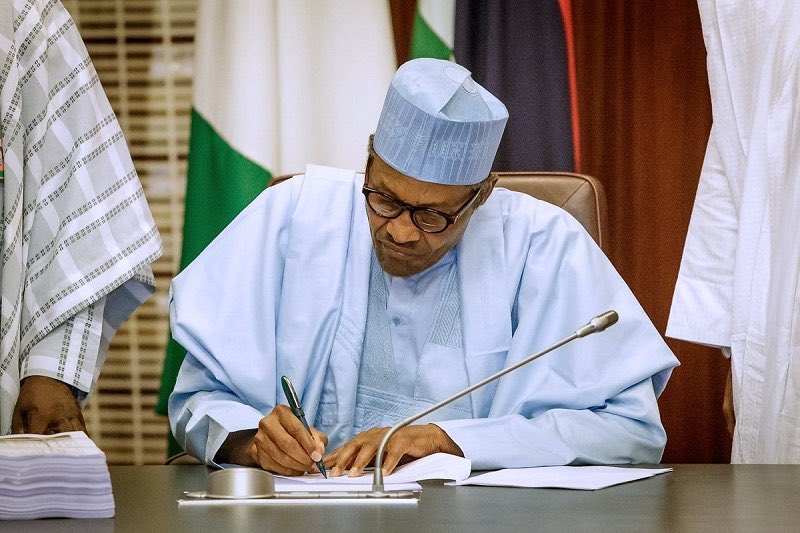Share!
The federal government has approved over N10 billion for projects in the aviation sector.
The approval includes the rehabilitation and reconstruction of the Hadejia Airstrip in Jigawa State at the sum of N7,482,071,196.56 for a period of 18 months.
Minister of Aviation, Hadi Sirika disclosed this to State House correspondents yesterday after the federal executive council meeting presided over by the vice president, Yemi Osinbajo at the Presidential Villa, Abuja.
He said Council also approved the construction of a control tower and technical building in Enugu, awarded to MESSERS Mascot Associates Limited at the sum of N1,973,606,141.75. And the third contract approved for aviation is the procurement of utility vehicles, to Messers Kaura Motors at N625,500,000.
“These are the memoranda and they’ve all been approved by Council today”, he said.
During his briefing, minister of communications and digital economy, Isa Pantami said, Council approved three memos, National Duct One Policy, National Child Online Protection Policy and Strategy and Nigeria Data Protection Bill.
According to him, the approval contains three items and said the contract was awarded to MESSRS CCECC.
He said the National Duct One Policy aims to institutionalise providing ducts during construction in Nigeria, at federal, state and even local government.
He said the policy came about after many stakeholder engagements with over 37 institutions of government.
The minister said with the approval, by implication, during road construction, bridges, rail lines, seaports, stadium and all other important buildings, provision must be made for ducts, where at least any wire or any gadget for electricity or telecommunications or any service that is required will make use of that facility and lay their cables.
Patanmi said, “This is the global best practice today. Before construction, even during the conceptualisation, design and construction, there should be provision of ducts for road construction, bridges, rail lines, seaports, and any important building.
“Today, we have been confronted with a challenge that whenever we want to provide telecommunications infrastructure, in some cities and towns in Nigeria, a lot of damage is being done, either to our roads or to our facilities.
“Why? Because during the design and construction, no provision of any duct or pipeline where the fiber optics and other telecommunication gadgets will pass. It is because of this we organised stakeholder engagement, where we brought all the stakeholders including the Ministry of Works and Housing, where we all agreed that there is a need to institutionalise the provision of ducts in design and construction.
“And there are so many benefits to be obtained from that. Number one, it allows shared infrastructure. Number two, it makes maintenance and repair much easier. If that is part of the design and construction, during maintenance, you don’t need to damage any road or any important building.
That provision is sufficient and you will have a chamber where you will get access to all the facilities. It is because of this, we came up with this policy and in addition to that, it will also continue to make the price of broadband cheaper.
“However, it is very cheap. In Nigeria as at August 2019, based on the official report of the Nigerian Communications Commission, one gigabyte of data, the price approximately was N1,200 but today the average price is N350. If you look at it, the reduction is even more than 60%.
“Because by laying fiber optics, a lot is being spent in doing that. When we try to reduce the price and the amount being spent in doing that, that is part of the cost of production. So it will automatically bring the cost of production lower and by implication, all of us will even get broadband access at more affordable prices than what is being obtained today.”
On the National Child Online Protection Policy and Strategy, Pantami said it is meant to protect children from online content that could corrupt their innocence.
He said: “As we all know, there are many benefits of going online. The world population reached 10 billion on the 15th November 2022. Today, we have around 6.3 billion people online and by implication, among this number, you will discover many children. They will not be able to differentiate between what is beneficial and what is harmful.
“According to the report of the International Telecommunication Union, even during COVID-19, more than one billion children were online, most of them for their studies, because schools were shut down. So, they switch to virtual learning only.
“Children will not be able to differentiate what is beneficial or what is harmful. And today, if you go online, you will discover that many things are coming into your device unsolicitedly. If you are at least matured, you will be able to avoid it but children would not be able to and that will definitely affect their innocence and will even affect them morally and otherwise.
“It is because of this that the International Telecommunication Union, which is an arm of the United Nations, came up with a policy document for all its 193 member countries. Nigeria is part and parcel of the International Telecommunication Union. The document has been titled: ‘keeping children safe in the digital environment, the importance of our protection under empowerment.’
“In this document, all member countries have been urged to ensure they come up with a policy where children are going to be protected.
“In the UK today, they have a bill that is for online safety. Many countries are working on a similar document. It is because of this, we organised stakeholder engagement, where we invited around 37 institutions of government, because if you look at the challenge is not only one sector, but rather it is multi sectoral issue, Minister of Information and Culture, National Broadcasting Commission (NBC) for example, national orientation agency, all of them have a role to play.
No related posts.
